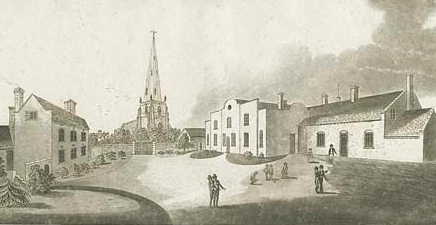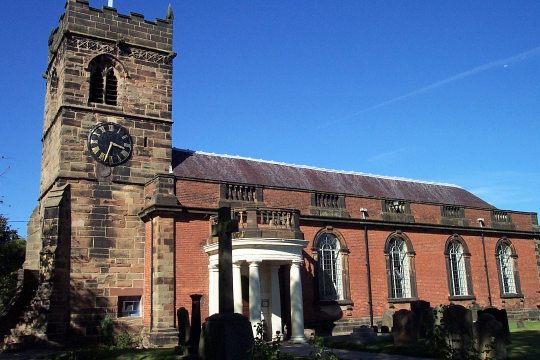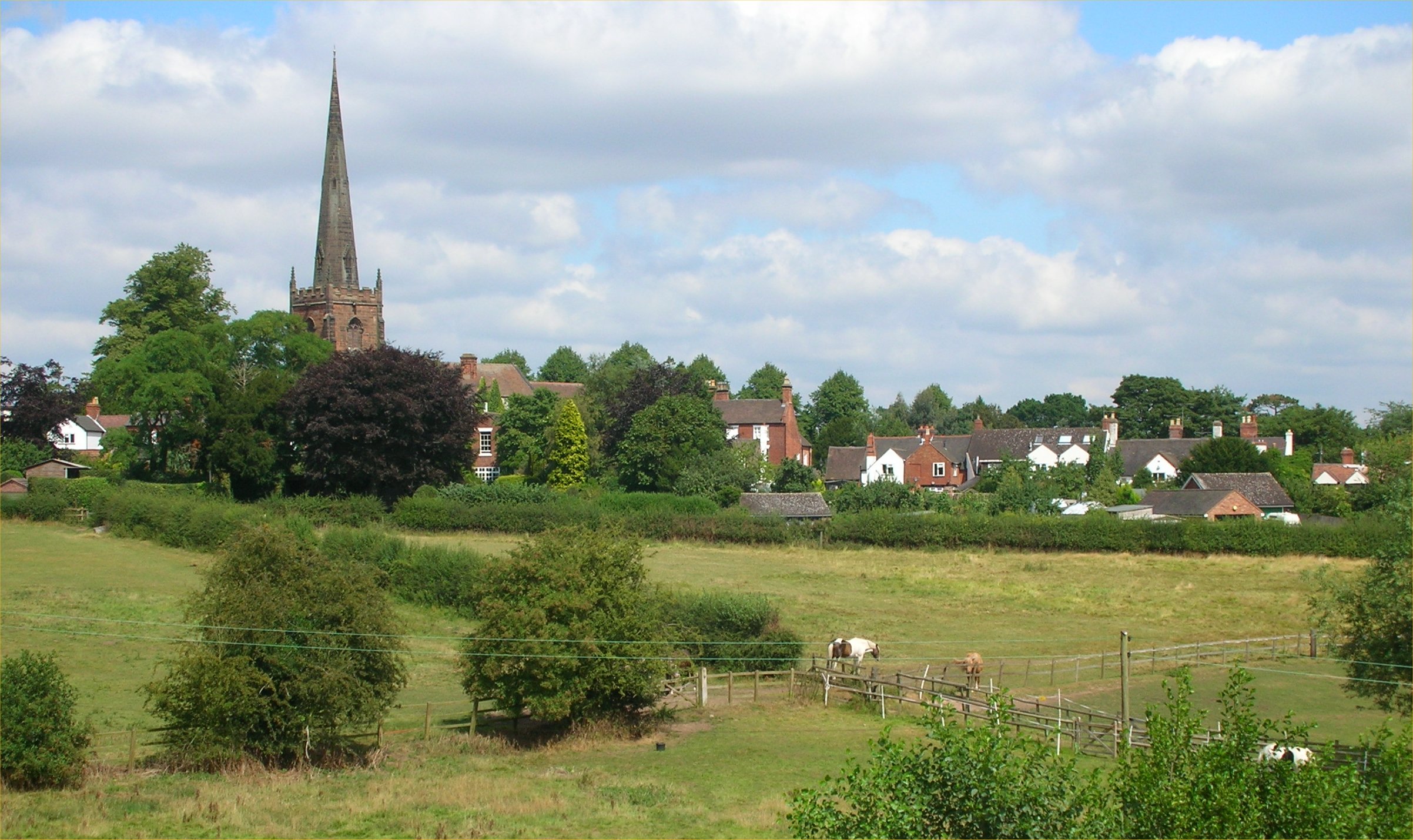|
Brewood Grammar School
Brewood Grammar School was a boys' school in the village of Brewood in South Staffordshire, England. Founded in the mid 15th century by the Bishop of Lichfield as a chantry school it was closed by the Dissolution of Chantries Act 1547. It was re-founded by Matthew Knightley and Sir Thomas Gifford in 1553 and survived as a grammar school until 1975 when its last headmaster, Roy Leafe, retired. It then became a mixed-sex middle school in 1977. As a 20th-century grammar school it took a number of boarders who lived at Wheaton Aston Hall, and taught agricultural science. The school had a small attached farm with cattle and poultry. The original building does not survive. The earliest part of the remaining buildings, originally two houses donated to the school, dates from 1778. In 1799 these were enclosed in the school grounds by moving the road. They were rebuilt in 1856 as Rushall House (now Grade II listed) and used as a schoolroom and dormitories. In 1863 the headmaster's hous ... [...More Info...] [...Related Items...] OR: [Wikipedia] [Google] [Baidu] |
William Budworth
William Budworth (1699 – September 1745) was a schoolmaster at Brewood in Staffordshire, England. He taught several notable pupils, but he is most remembered for not employing Samuel Johnson as an assistant at Brewood Grammar School. Life and career Budworth was born in about 1699 in Marston on Dove, the son of the Reverend Luke Budworth Bachelor of Arts, BA, Rector (ecclesiastical), rector of Cubley, Derbyshire, Cubley and vicar of Longford, Derbyshire, Longford, Derbyshire, and afterwards rector of the parishes of Tillesham and Wellingham in Norfolk following the recommendation of Thomas Coke. He was educated at Derby School and the grammar school at Market Bosworth under Anthony Blackwall, and then at Christ's College, Cambridge (BA 1720, Master of Arts (Oxbridge and Dublin), MA 1726). [...More Info...] [...Related Items...] OR: [Wikipedia] [Google] [Baidu] |
Brewood Grammar School 1799 7475-0
Brewood is an ancient market town in the civil parish of Brewood and Coven, in the South Staffordshire district, in the county of Staffordshire, England. Located around , Brewood lies near the River Penk, eight miles north of Wolverhampton city centre and eleven miles south of the county town of Stafford. A few miles to the west of Brewood is the border with the county of Shropshire. Etymology The Domesday Book of 1086 documented the town as 'Breude'. The name is probably a compound made up of a Celtic, Brythonic word with an Anglo Saxon, Old English word. The first element is the British word 'briga', which appears in modern Welsh as 'bre'. This is the most common of a number of Celtic place-name elements signifying a hill. It appears in various combinations, but sometimes on its own, as in Bray. Margaret Gelling, a specialist in West Midland toponyms, suggested that it was often misunderstood by the Anglo-Saxons as a name rather than as a common noun. So they thought they ... [...More Info...] [...Related Items...] OR: [Wikipedia] [Google] [Baidu] |
Mary Whitehouse
Constance Mary Whitehouse (; 13 June 1910 – 23 November 2001) was a British teacher and conservative activist. She campaigned against social liberalism and the mainstream British media, both of which she accused of encouraging a more permissive society. She was the founder and first president of the National Viewers' and Listeners' Association, through which she led a longstanding campaign against the BBC. A hard-line social conservative, she was termed a reactionary by her socially liberal opponents. Her motivation derived from her Christian beliefs, her aversion to the rapid social and political changes in British society of the 1960s, and her work as a teacher of sex education. Whitehouse became an art teacher, at the same time becoming involved in evangelical Christian groups such as the Student Christian Movement (which became increasingly more liberal leading up to, and after, a 1928 split with the Universities and Colleges Christian Fellowship) and Moral Re-Armament. ... [...More Info...] [...Related Items...] OR: [Wikipedia] [Google] [Baidu] |
Educational Institutions Disestablished In 1975
Education is a purposeful activity directed at achieving certain aims, such as transmitting knowledge or fostering skills and character traits. These aims may include the development of understanding, rationality, kindness, and honesty. Various researchers emphasize the role of critical thinking in order to distinguish education from indoctrination. Some theorists require that education results in an improvement of the student while others prefer a value-neutral definition of the term. In a slightly different sense, education may also refer, not to the process, but to the product of this process: the mental states and dispositions possessed by educated people. Education originated as the transmission of cultural heritage from one generation to the next. Today, educational goals increasingly encompass new ideas such as the liberation of learners, skills needed for modern society, empathy, and complex vocational skills. Types of education are commonly divided into formal, ... [...More Info...] [...Related Items...] OR: [Wikipedia] [Google] [Baidu] |
1450s Establishments In England
*
{{Number disambiguation ...
145 may refer to: *145 (number), a natural number *AD 145, a year in the 2nd century AD *145 BC, a year in the 2nd century BC *145 (dinghy), a two-person intermediate sailing dinghy *145 (South) Brigade *145 (New Jersey bus) See also * List of highways numbered 145 The following highways are numbered 145: Australia * Lower Barrington Road, Paloona Road, Melrose Road, Bellamy Road, Forthside Road (Tasmania) * Inverleigh–Winchelsea Road (Victoria) Canada * Winnipeg Route 145 * New Brunswick Route 145 * ... [...More Info...] [...Related Items...] OR: [Wikipedia] [Google] [Baidu] |
Grade II Listed Educational Buildings
Grade most commonly refers to: * Grade (education), a measurement of a student's performance * Grade, the number of the year a student has reached in a given educational stage * Grade (slope), the steepness of a slope Grade or grading may also refer to: Music * Grade (music), a formally assessed level of profiency in a musical instrument * Grade (band), punk rock band * Grades (producer), British electronic dance music producer and DJ Science and technology Biology and medicine * Grading (tumors), a measure of the aggressiveness of a tumor in medicine * The Grading of Recommendations Assessment, Development and Evaluation (GRADE) approach * Evolutionary grade, a paraphyletic group of organisms Geology * Graded bedding, a description of the variation in grain size through a bed in a sedimentary rock * Metamorphic grade, an indicatation of the degree of metamorphism of rocks * Ore grade, a measure that describes the concentration of a valuable natural material in the surround ... [...More Info...] [...Related Items...] OR: [Wikipedia] [Google] [Baidu] |
Defunct Grammar Schools In England
{{Disambiguation ...
Defunct (no longer in use or active) may refer to: * ''Defunct'' (video game), 2014 * Zombie process or defunct process, in Unix-like operating systems See also * * :Former entities * End-of-life product * Obsolescence Obsolescence is the state of being which occurs when an object, service, or practice is no longer maintained or required even though it may still be in good working order. It usually happens when something that is more efficient or less risky r ... [...More Info...] [...Related Items...] OR: [Wikipedia] [Google] [Baidu] |
Grade II Listed Buildings In Staffordshire
Grade most commonly refers to: * Grade (education), a measurement of a student's performance * Grade, the number of the year a student has reached in a given educational stage * Grade (slope), the steepness of a slope Grade or grading may also refer to: Music * Grade (music), a formally assessed level of profiency in a musical instrument * Grade (band), punk rock band * Grades (producer), British electronic dance music producer and DJ Science and technology Biology and medicine * Grading (tumors), a measure of the aggressiveness of a tumor in medicine * The Grading of Recommendations Assessment, Development and Evaluation (GRADE) approach * Evolutionary grade, a paraphyletic group of organisms Geology * Graded bedding, a description of the variation in grain size through a bed in a sedimentary rock * Metamorphic grade, an indicatation of the degree of metamorphism of rocks * Ore grade, a measure that describes the concentration of a valuable natural material in the surroundin ... [...More Info...] [...Related Items...] OR: [Wikipedia] [Google] [Baidu] |
Defunct Schools In Staffordshire
{{Disambiguation ...
Defunct (no longer in use or active) may refer to: * ''Defunct'' (video game), 2014 * Zombie process or defunct process, in Unix-like operating systems See also * * :Former entities * End-of-life product * Obsolescence Obsolescence is the state of being which occurs when an object, service, or practice is no longer maintained or required even though it may still be in good working order. It usually happens when something that is more efficient or less risky r ... [...More Info...] [...Related Items...] OR: [Wikipedia] [Google] [Baidu] |
Educational Institutions Established In The 15th Century
Education is a purposeful activity directed at achieving certain aims, such as transmitting knowledge or fostering skills and character traits. These aims may include the development of understanding, rationality, kindness, and honesty. Various researchers emphasize the role of critical thinking in order to distinguish education from indoctrination. Some theorists require that education results in an improvement of the student while others prefer a value-neutral definition of the term. In a slightly different sense, education may also refer, not to the process, but to the product of this process: the mental states and dispositions possessed by educated people. Education originated as the transmission of cultural heritage from one generation to the next. Today, educational goals increasingly encompass new ideas such as the liberation of learners, skills needed for modern society, empathy, and complex vocational skills. Types of education are commonly divided into formal, ... [...More Info...] [...Related Items...] OR: [Wikipedia] [Google] [Baidu] |
Conservative Party (UK)
The Conservative Party, officially the Conservative and Unionist Party and also known colloquially as the Tories, is one of the Two-party system, two main political parties in the United Kingdom, along with the Labour Party (UK), Labour Party. It is the current Government of the United Kingdom, governing party, having won the 2019 United Kingdom general election, 2019 general election. It has been the primary governing party in Britain since 2010. The party is on the Centre-right politics, centre-right of the political spectrum, and encompasses various ideological #Party factions, factions including One-nation conservatism, one-nation conservatives, Thatcherism, Thatcherites, and traditionalist conservatism, traditionalist conservatives. The party currently has 356 Member of Parliament (United Kingdom), Members of Parliament, 264 members of the House of Lords, 9 members of the London Assembly, 31 members of the Scottish Parliament, 16 members of the Senedd, Welsh Parliament, 2 D ... [...More Info...] [...Related Items...] OR: [Wikipedia] [Google] [Baidu] |
Sir Patrick Cormack
Patrick Thomas Cormack, Baron Cormack, (born 18 May 1939) is a British politician, historian, journalist and author. He served as a Member of Parliament (MP) for 40 years, from 1970 to 2010. Cormack is a member of the Conservative Party and is seen as a one-nation conservative. Before entering Parliament, Cormack was a teacher. He was elected for Cannock at the 1970 general election. Following boundary changes he was elected for South West Staffordshire in 1974, renamed South Staffordshire in 1983. He was elected chair of the Northern Ireland Affairs Select Committee in 2005. Since standing down from the House of Commons in 2010, he has served as an active life peer in the House of Lords. Early life and career Cormack was born to Thomas Charles and Kathleen Mary Cormack in Grimsby just before the outbreak of World War II. He was educated locally at the St James's Choir School and the Havelock School, before attending the University of Hull, where he received a Bachelor of ... [...More Info...] [...Related Items...] OR: [Wikipedia] [Google] [Baidu] |






